By: Lisa Sheffield Guy, Helen Aderman, Beth Leonard, and Tonia Osborne
The Arctic Indigenous Scholars Program, led by the Arctic Research Consortium of the U.S. (ARCUS) and the Inuit Circumpolar Council (ICC) Alaska, and supported by the National Science Foundation's Division of Arctic Sciences, aims to create a space for Indigenous scholars to educate and inform policy- and decision-makers engaged in Arctic issues in Washington, D.C. The program defines a scholar as an expert within their own knowledge system.
During 2019—the second year of the program—a five-member volunteer selection committee composed of Arctic Indigenous leaders selected four scholars for the opportunity. The 2019 scholars included Helen Aderman (Yup'ik), with interests in marine ecosystems and subsistence; Beth Leonard (Athabascan), with a focus on higher education for Alaskan Native students; Tonia Osborne (Inupiaq), with focus on marine science, climate change, and incorporating Indigenous knowledge into science; and Mark Miklahook (St. Lawrence Island Yupik), with interest in language and cultural resources for St. Lawrence Island. Please see our webpage for more information on each scholar and a recording of Helen Aderman's seminar. The scholars met with a variety of organizations and leaders in the capital, specific to their interests. ARCUS would like to thank the following organizations for hosting the scholars in Washington, D.C.: U.S. Global Change Research Program, Interagency Arctic Research Policy Committee (IARPC), Office of Science and Technology Policy, Smithsonian Arctic Studies Center, The Arctic Institute, National Oceanographic and Atmospheric Administration (NOAA), National Science Foundation (NSF), Senator Lisa Murkowski, Senator Dan Sullivan, U.S. Department of Education, U.S. Bureau of Indian Education, National Congress of American Indians (NCAI), and National Council for Science and the Environment.
Below, three of the 2019 Arctic Indigenous Scholars share their experiences.
Helen Aderman
Helen Kegginarrluk Aderman is Yup'ik born in Togiak, Alaska, from Aleknagik, Alaska. She is the Bristol Bay Native Association's Marine Mammal Manager, based in Dillingham, and the Executive Director of the Qayassiq Walrus Commission and Bristol Bay Marine Mammal Council. She holds a B.A. in Rural Development from University of Alaska Fairbanks.
Helen was the first of the four 2019 scholars to travel to Washington, D.C. during 5–9 May. She met with federal stakeholders to make them aware of Bristol Bay Native issues, including the need to establish long-term marine ecosystem habitat protective measures. Federal and state partners have not supported the recommendations of both Qayassiq Walrus Commission and Bristol Bay Marine Mammal Council. The recommendation to the federal and state agencies is to work together on establishing a permanent marine mammal habitat corridor in the Togiak Bay, Alaska area that would protect the marine mammals, their habitat, and other multi-species from impacts of the seasonal Northern Bristol Bay yellowfin sole trawl fishery; and to have access on these waters every year from 1 April–15 August.
Helen presented an ARCUS webinar titled, "Impacts on Marine Mammal Habitat Use Areas to Ensure Future of Subsistence Resource Use Areas Including Multi-Species Habitats in Bristol Bay, Alaska", which can be viewed here.
Beth Leonard
Beth Ginondidoy Leonard is Deg Xit'an Athabascan and member of the Shageluk Tribe of interior Alaska. She is professor of Alaska Native Studies at the University of Alaska Anchorage. She holds a PhD in Cross-Cultural Studies from the University of Alaska Fairbanks.
Beth traveled to Washington, D.C. with Mark Miklahook and Tonia Osborne in May 2019. During this visit she met with education and Arctic Social Sciences staff from the National Science Foundation, NCAI, and the Bureau of Indian Education to learn about recent initiatives and potential funding opportunities to promote Alaska Native student success in higher education.
Tonia Osborne
Tonia Qanannaq Osborne is Inupiaq from the Norton Sound Region. She grew up in White Mountain and Nome. She is graduating from the University of Alaska Southeast this December 2019 with her Bachelor's in Marine Biology.
Tonia has been doing research on marine mammals and how we can incorporate traditional and Indigenous knowledge into western science. It is important that we respect the needs and cultural values of Indigenous communities when conducting research on their home land. These collaborations are necessary to understand the effects of climate change on the Arctic marine ecosystem. Climate change in the Arctic is more rapid than any other biome in the world—with sea ice melting, rising sea levels, changes in snow cover, and ocean acidification affecting polar waters. These environmental changes are fundamentally influencing Arctic and sub-Arctic marine food webs. Many people in the Arctic, particularly Indigenous people, depend on the ocean as a source of food. Indigenous communities depend on marine mammals and are woven into Arctic Indigenous culture through food, spirituality, medicine, and social ties. It is so vital to incorporate traditional knowledge from elders, hunters and gatherers, and villagers in scientific research. Environmental disruptions will ultimately have detrimental effects on Arctic Indigenous communities. It is important to incorporate funds in Arctic research towards training scientists and researchers on Arctic Indigenous culture and how to properly retain data from traditional knowledge.
In D.C., Tonia spoke to scientists and researchers, policy makers, and professionals about the importance of traditional knowledge. She went to various organizations like NOAA, NSF, NCAI, and others. She sought advice on what she can do as a young scientist pursuing this field, as well as what steps she can take as a graduating senior.
We hope to include a contribution from 2019 Arctic Indigenous Scholar, Mark Miklahook, in a future issue of Witness the Arctic.
The Arctic Indigenous Scholars Program will continue in 2020 with support from the National Science Foundation. The application period will open in winter 2019/2020, with scholars traveling in late spring. Application information will be announced on the Arctic Indigenous Scholars webage and circulated through ARCUS' communication channels.
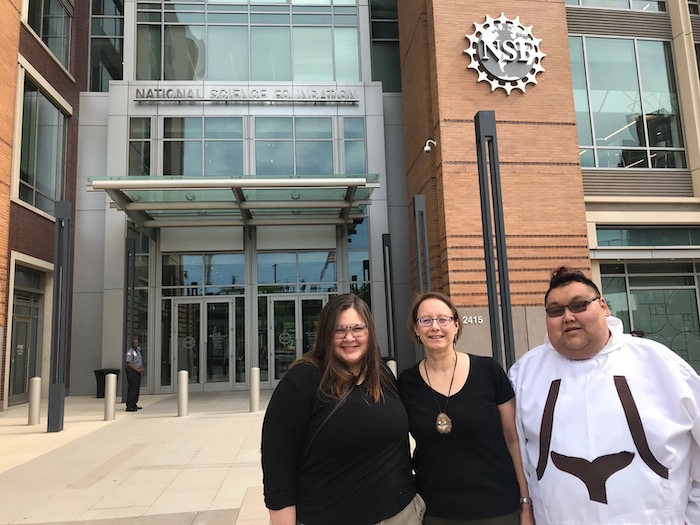
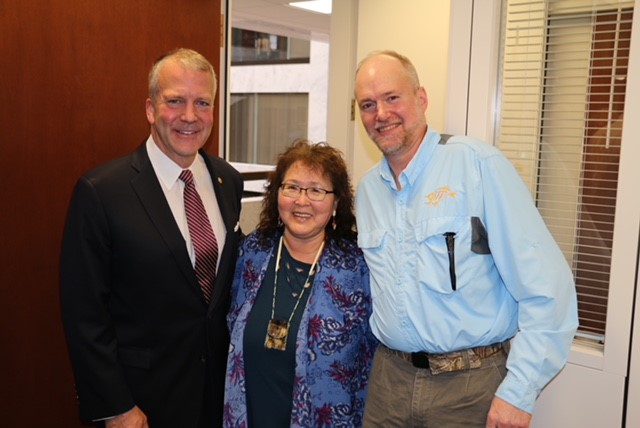
About the Authors
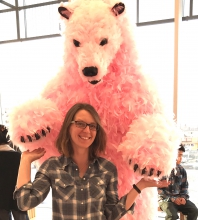 Lisa joined ARCUS in 2015. She works on a variety of projects, including the Sea Ice for Walrus Outlook, Arctic Indigenous Scholars, and The Arctic in the Classroom, among others. Lisa has been working in Alaskan ecosystems since 2002 and earned BS and MS degrees in Wildlife Science from Oregon State University where she studied seabirds as indicators of climate change on St. Lawrence Island, AK. Her professional interests include the impact of changing climate on ecosystems and communities, science communication, and equitable inclusion of Indigenous Knowledge in science and policy. Lisa lives with her husband and wildling sons near Pescadero, CA. Outside of work, Lisa is usually obsessing over her herb garden, looking for interesting snakes, boating, camping, fussing over chickens, and working on restoring the lovely patch of oak woodland where she lives.
Lisa joined ARCUS in 2015. She works on a variety of projects, including the Sea Ice for Walrus Outlook, Arctic Indigenous Scholars, and The Arctic in the Classroom, among others. Lisa has been working in Alaskan ecosystems since 2002 and earned BS and MS degrees in Wildlife Science from Oregon State University where she studied seabirds as indicators of climate change on St. Lawrence Island, AK. Her professional interests include the impact of changing climate on ecosystems and communities, science communication, and equitable inclusion of Indigenous Knowledge in science and policy. Lisa lives with her husband and wildling sons near Pescadero, CA. Outside of work, Lisa is usually obsessing over her herb garden, looking for interesting snakes, boating, camping, fussing over chickens, and working on restoring the lovely patch of oak woodland where she lives.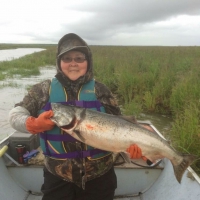 Helen Kegginarrluk Aderman is Yup'ik born in Togiak, Alaska, from Aleknagik, Alaska. She is the Bristol Bay Native Association's Marine Mammal Manager, based in Dillingham, and the Executive Director of the Qayassiq Walrus Commission and Bristol Bay Marine Mammal Council. She holds a B.A. in Rural Development from University of Alaska Fairbanks. Helen is working to address impacts on marine mammal habitat use areas and to ensure future Alaska Native generations will have continued access to their traditional marine foods for harvest.
Helen Kegginarrluk Aderman is Yup'ik born in Togiak, Alaska, from Aleknagik, Alaska. She is the Bristol Bay Native Association's Marine Mammal Manager, based in Dillingham, and the Executive Director of the Qayassiq Walrus Commission and Bristol Bay Marine Mammal Council. She holds a B.A. in Rural Development from University of Alaska Fairbanks. Helen is working to address impacts on marine mammal habitat use areas and to ensure future Alaska Native generations will have continued access to their traditional marine foods for harvest.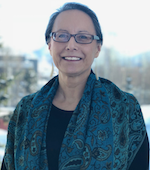 Beth Ginondidoy Leonard is professor and director of the Alaska Native Studies Program at the University of Alaska Anchorage. She is Deg Xit'an (Athabascan) and member of the Shageluk Tribe of interior Alaska; her parents are James, and the late Jean Dementi. In 2014, she was awarded a Fulbright U.S. Core Scholarship and spent five months at Te Kawa a Māui – School of Māori Studies at Victoria University of Wellington (VUW). During that time, she taught a joint University of Alaska-VUW videoconference with Dr. Ocean Mercier, and researched Māori student recruitment, retention, and mentoring. Beth is a member of the Alaska Native Studies Council, and UArctic Indigenous Issues Committee. Her current research investigates the confluences of Indigenous methodologies, knowledges, and pedagogies in shaping Indigenous spaces in higher education.
Beth Ginondidoy Leonard is professor and director of the Alaska Native Studies Program at the University of Alaska Anchorage. She is Deg Xit'an (Athabascan) and member of the Shageluk Tribe of interior Alaska; her parents are James, and the late Jean Dementi. In 2014, she was awarded a Fulbright U.S. Core Scholarship and spent five months at Te Kawa a Māui – School of Māori Studies at Victoria University of Wellington (VUW). During that time, she taught a joint University of Alaska-VUW videoconference with Dr. Ocean Mercier, and researched Māori student recruitment, retention, and mentoring. Beth is a member of the Alaska Native Studies Council, and UArctic Indigenous Issues Committee. Her current research investigates the confluences of Indigenous methodologies, knowledges, and pedagogies in shaping Indigenous spaces in higher education.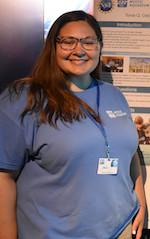 Tonia Qanannaq Osborne is Inupiaq from the village of White Mountain, Alaska but she also grew up in Nome. She is a senior at the University of Alaska Southeast in Juneau where she is studying marine biology. Tonia is an Alaska Native Science and Engineering Program (ANSEP) university success student as well as a Caleb Pungowiyi Scholar. As an undergraduate, she is very involved with research with marine mammals through an REU (Research Experience for Undergraduates) program at Mystic Aquarium. Tonia will continue to do research with her university until she graduates. She is very interested in incorporating traditional knowledge from hunters, villagers, and elders in scientific research as the Arctic is experiencing amplified effects of climate change.
Tonia Qanannaq Osborne is Inupiaq from the village of White Mountain, Alaska but she also grew up in Nome. She is a senior at the University of Alaska Southeast in Juneau where she is studying marine biology. Tonia is an Alaska Native Science and Engineering Program (ANSEP) university success student as well as a Caleb Pungowiyi Scholar. As an undergraduate, she is very involved with research with marine mammals through an REU (Research Experience for Undergraduates) program at Mystic Aquarium. Tonia will continue to do research with her university until she graduates. She is very interested in incorporating traditional knowledge from hunters, villagers, and elders in scientific research as the Arctic is experiencing amplified effects of climate change.
